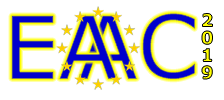Speaker
Description
High-intensity laser facilities can now routinely generate GeV electron bunches and broadband multi-keV X-rays using laser-driven wakefield accelerators. These energetic sources are ultra-short in duration (femtoseconds) with a small source size (microns) and low divergence (miliradians). They are also inherently synchronised to the drive laser itself, making pump-probe setups possible.
The TeX-Mex project aims to utilise these unique capabilities to perform experimental measurements of various physical phenomena in extreme conditions. This includes X-ray absorption measurements of high-energy-density samples which mirror the interior of large astrophysical objects, and the study of high-density photon interactions that give rise to QED and high-field processes such as Breit-Wheeler pair production and radiation reaction effects.
An overview of the project is given and a summary of recent results from experimental campaigns conducted by our group and on-going collaborations is presented.

